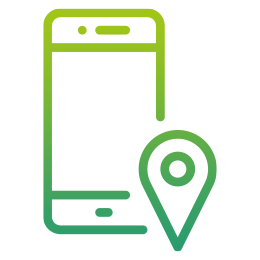Location-based Services:
Questions, Answers & Examples for Location-based Services
Location-based services are used in many industries, such as retail/stationary trade, transport, tourism and as a component of successful digitization in industry 4.0.
Indoors, other techniques are used than outdoors, where in most cases GPS positioning is possible. Indoors, GPS positioning is limited or not possible at all.
94 percent of the 14- to 49-year olds in Germany own a smartphone.
If only a certain area or zone is defined, for example at a trade fair or amusement park, in which a user is to be addressed, one speaks of geofencing. In the food trade, such a broad positioning is of course not sufficient. There are technologies with which a position can be determined to an accuracy of 30 centimetres. On the basis of such positioning, customers in the retail trade can even be guided to the product on the corresponding shelf.
If you are looking for a location-based services provider, you should make sure that it is not limited to one technology.
Conversely, service providers receive very accurate user movement data. This data is used to optimize marketing measures or to optimize workflows or logistical processes.





























